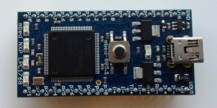You are viewing an older revision! See the latest version
mbed NXP LPC1768

mbed NXP LPC1768 (see all)
Rapid Prototyping for general microcontroller applications, Ethernet, USB and 32-bit ARM® Cortex™-M3 based designs
Overview¶
The mbed Microcontrollers are a series of ARM microcontroller development boards designed for rapid prototyping.
- Find out more about all mbed Microcontrollers
The mbed NXP LPC1768 Microcontroller in particular is designed for prototyping all sorts of devices, especially those including Ethernet, USB, and the flexibility of lots of peripheral interfaces and FLASH memory. It is packaged as a small DIP form-factor for prototyping with through-hole PCBs, stripboard and breadboard, and includes a built-in USB FLASH programmer.

It is based on the NXP LPC1768, with a 32-bit ARM Cortex-M3 core running at 96MHz. It includes 512KB FLASH, 32KB RAM and lots of interfaces including built-in Ethernet, USB Host and Device, CAN, SPI, I2C, ADC, DAC, PWM and other I/O interfaces. The pinout above shows the commonly used interfaces and their locations. Note that all the numbered pins (p5-p30) can also be used as DigitalIn and DigitalOut interfaces.
The mbed Microcontrollers provide experienced embedded developers a powerful and productive platform for building proof-of-concepts. For developers new to 32-bit microcontrollers, mbed provides an accessible prototyping solution to get projects built with the backing of libraries, resources and support shared in the mbed community.
Features¶
- NXP LPC1768 MCU
- High performance ARM® Cortex™-M3 Core
- 96MHz, 32KB RAM, 512KB FLASH
- Ethernet, USB Host/Device, 2xSPI, 2xI2C, 3xUART, CAN, 6xPWM, 6xADC, GPIO
- Prototyping form-factor
- 40-pin 0.1" pitch DIP package, 54x26mm
- 5V USB or 4.5-9V supply
- Built-in USB drag 'n' drop FLASH programmer
- mbed.org Developer Website
- Lightweight Online Compiler
- High level C/C++ SDK
- Cookbook of published libraries and projects
Tools and Software¶
The mbed Microcontrollers are all supported by the mbed.org developer website, including a lightweight Online Compiler for instant access to your working environment on Windows, Linux or Mac OS X.
- Find out more about the mbed Online Compiler
Also included is a C/C++ SDK for productive high-level programming of peripherals. Combined with the wealth of libraries and code examples being published by the mbed community, the platform provides a productive environment for getting things done.
The mbed NXP LPC1768 is one of a range of mbed Microcontrollers packaged as a small 40-pin DIP, 0.1-inch pitch form-factor making it convenient for prototyping with solderless breadboard, stripboard, and through-hole PCBs. It includes a built-in USB programming interface that is as simple as using a USB Flash Drive. Plug it in, drop on an ARM program binary, and its up and running! It is our most full featured board and is great for all kinds of general prototyping. If you're not sure which mbed to get, this is your best choice.
Technical Reference¶
Power
- Powered by USB or 4.5v - 9.0v appiled to VIN
- <200mA (100mA with Ethernet disabled)
- Real-time clock battery backup input VB
- 1.8v - 3.3v Keeps Real-time clock running
- Requires 27uA, can be supplied by a coin cell
- 3.3v regulated output on VOUT to power peripherals
- 5.0v from USB available on VU (only available when USB is connected!)
- Current limited to 500mA
- Digital IO pins are 3.3v, 40mA each, 400mA max total
Pins
- Vin - External Power supply to the board
- 4.5v-9v, 100mA + external circuits powered through the Microcontroller
- Vb - Battery backup input for Real Time Clock
- 1.8v-3.3v, 30uA
- nR - Active-low reset pin with identical functionality to the reset button.
- Pull up resistor is on the board, so it can be driven with an open collector
- IF+/- - Reserved for testing
The microcontroller I/O is all 3.3v logic, but 5v tolerant. A digital pin can drive 40mA, up to a total of 400mA.
Schematics and Data Sheets¶
mbed NXP LPC1768 Microcontroller
NXP LPC176x MCU